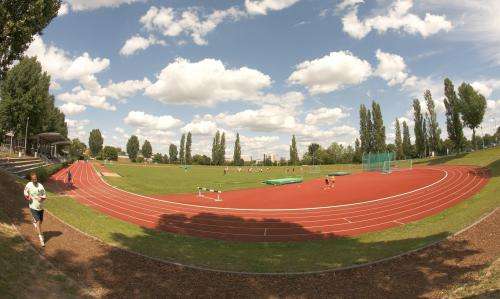Scientific study suggests an association between physical doping and brain doping

Physical doping and brain doping apparently often go hand in hand. A study from Johannes Gutenberg University Mainz (JGU) and Eberhard Karls University in Tubingen revealed that people who engage in physical doping often also take drugs for brain doping. The study was the first of its kind to survey simultaneously the two categories of doping and brain doping. Around 3,000 hobby triathletes were anonymously surveyed using a questionnaire at sporting events in Frankfurt, Regensburg, and Wiesbaden. "The results correlated with earlier findings about doping in leisure and popular sports and brain doping in society as a whole. The findings also illustrated for the first time that physical doping and brain doping often go together, at least for recreational triathletes," said Mainz University Professor of Sports Medicine Dr. Dr. Perikles Simon.
The study was carried out using the randomized response technique (RRT), which allows for better estimates of unknown cases in response to sensitive questions. It suggested that 13.0 percent of the athletes surveyed had used illegal and banned substances in the twelve months prior to the survey; 15.1 percent were believed to have engaged in brain doping.
When talking about doping substances, a distinction is made between illicit drugs such as cocaine or heroin and banned substances for physical performance enhancement such as anabolic steroids, EPO, or growth hormones. Brain doping is the use of illegal substances and pharmaceuticals such as illegal amphetamines, modafinil or Ritalin to improve mental performance.
The findings indicate that the estimated proportion of men who dope (13.7 percent) is higher than the proportion of women (8.0 percent). The prevalence of doping also seemed to be higher at the European Championships in Frankfurt than at the other triathlons in Regensburg and Wiesbaden. The competitions involved participants taking part in either a classic Ironman with a 4 kilometer swim, 180 kilometer cycle ride, and 42 kilometer marathon or tackling half of the actual Ironman distance.
In their survey carried out during the 2011 season, the scientists interviewed a total of 2,997 triathlon participants. 2,987 questionnaires (99.7 percent) were returned. The study also examined whether there was a correlation between the use of legal and freely available substances for improving physical and mental performance and the use of illegal and banned substances. This would appear to be the case, as athletes who use legal substances to improve their performance also tend to use illegal substances as well.
Finally, another important finding of the study was the sign of a correlation between physical doping and brain doping, which can be found with both legal and illicit substances. The use of legal substances to enhance physical performance is thus relatively often associated with the consumption of substances to improve mental performance, just as there is a correlation between the use of illicit substances for both doping and brain doping. "This indicates that athletes do not actually take the substances to achieve a specific goal, but may show a certain propensity towards performance enhancing substances," explained Simon. The findings are important to better understand why people take such substances and to be able to provide targeted prevention.
Scientists from the Sports Medicine, Prevention, and Rehabilitation division at the Institute of Sports Science and the Department of Psychiatry and Psychotherapy at the University Medical Center of Johannes Gutenberg University Mainz and from the Department of General Psychology and the Department of Sports Medicine at Eberhard Karls University in Tubingen took part in the study entitled "Associations between physical and cognitive doping – a cross-sectional study in 2.997 triathletes". The study was also carried out in cooperation with the IRONMAN headquarters in Hanau, Germany.
More information: P. Dietz et al., Associations between Physical and Cognitive Doping – A Cross-Sectional Study in 2.997 Triathletes, PLOS ONE, 8:11, 13 November 2013, DOI: 10.1371/journal.pone.0078702
















